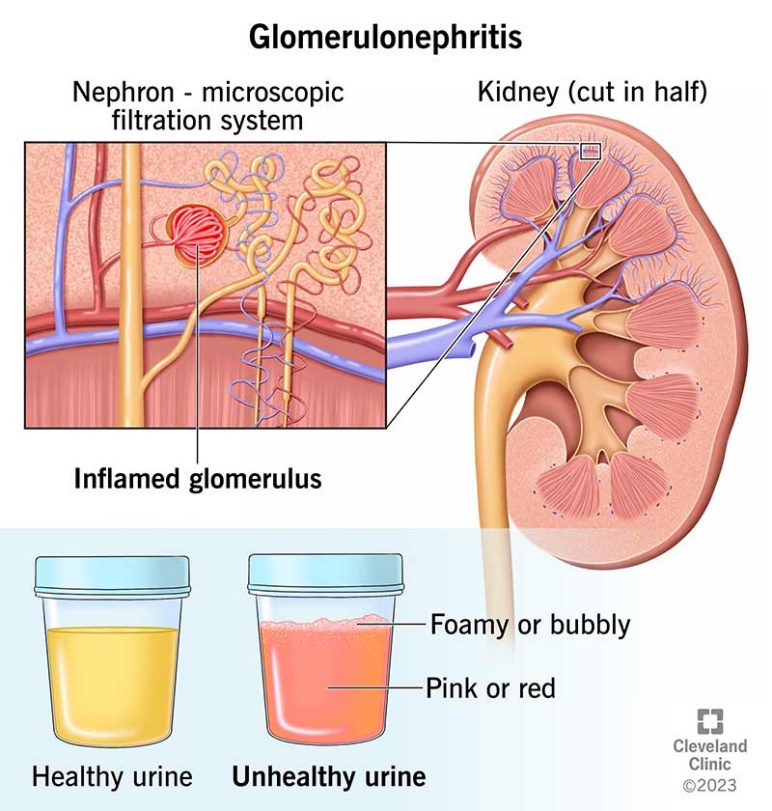A nurse is caring for a male client who has chronic glomerulonephritis. Which of the following findings should the nurse expect?
Urine specific gravity 1.035
Serum creatinine 7 mg/dL
Creatinine clearance 120 mL/min
BUN 15 mg/dL
The Correct Answer is B
Choice A reason:
Urine specific gravity is a measure of urine concentration. The normal range is typically from 1.005 to 1.030. A specific gravity of 1.035 indicates very concentrated urine, which could be due to dehydration or other factors, but it is not specifically indicative of chronic glomerulonephritis.
Choice B reason:
Serum creatinine is a waste product from the normal breakdown of muscle tissue. Normal levels are approximately 0.6 to 1.2 mg/dL for males. A level of 7 mg/dL is significantly elevated and can indicate severe kidney dysfunction, which is consistent with chronic glomerulonephritis. This condition can lead to a decreased ability of the kidneys to filter waste, causing an accumulation of creatinine in the blood.
Choice C reason:
Creatinine clearance is a test that measures how well creatinine is removed from the blood by the kidneys. The normal range is about 95 to 120 mL/min. A clearance of 120 mL/min is within the normal range and would not typically be expected in a client with chronic glomerulonephritis, as this condition usually results in reduced kidney function.
Choice D reason:
Blood urea nitrogen (BUN) is another waste product filtered by the kidneys. Normal BUN levels are between 7 and 20 mg/dL. A BUN of 15 mg/dL is within the normal range and does not necessarily indicate kidney dysfunction from chronic glomerulonephritis.

Nursing Test Bank
Naxlex Comprehensive Predictor Exams
Related Questions
Correct Answer is D
Explanation
Choice A reason:
Telling a client that they will be at an increased risk of breast cancer due to fibrocystic breast changes would be incorrect. Fibrocystic breast changes are not directly linked to an increased risk of breast cancer. While the presence of complex fibrocystic changes may slightly elevate the risk, fibrocystic breasts themselves are a common and benign condition.
Choice B reason:
It is not accurate to say that the manifestations of fibrocystic breasts often get worse after menopause. In fact, fibrocystic changes are related to hormone levels, and most women experience relief from these symptoms after menopause when hormone levels decline.
Choice C reason:
Stating that menopause won't have any effect on the manifestations is also incorrect. Menopause typically leads to a decrease in hormone levels, which are associated with fibrocystic breast changes. Therefore, most women see an improvement in their symptoms after menopause.
Choice D reason:
The most appropriate response is that the manifestations usually go away after menopause. Fibrocystic breast changes are linked to hormonal fluctuations, and after menopause, when these fluctuations cease, the symptoms of fibrocystic breasts typically resolve.
Correct Answer is D
Explanation
Choice A reason: Positive Trousseau's sign
Trousseau's sign is indicative of hypocalcemia, not CTS. It is elicited by inflating a blood pressure cuff on the upper arm to above systolic pressure for 3 minutes. A positive sign is characterized by carpal spasm, which is not related to CTS.
Choice B reason: Cool extremities
Cool extremities can be a result of various conditions, including peripheral vascular disease or hypothyroidism. They are not a specific indicator of CTS, which primarily affects nerve function rather than blood circulation or temperature regulation.
Choice C reason: Decreased radial pulse
A decreased radial pulse is not typically associated with CTS. It may indicate a cardiovascular issue or a blockage in the radial artery, which would require further investigation unrelated to CTS.
Choice D reason: Positive Phalen's sign
Phalen's sign is a diagnostic test for CTS. The test is performed by having the patient flex their wrist maximally and hold the position for about 60 seconds. A positive Phalen's sign, which includes numbness and tingling in the thumb, index finger, middle finger, and the radial half of the ring finger, is indicative of CTS. This occurs due to increased pressure on the median nerve when the wrist is in flexion.
Whether you are a student looking to ace your exams or a practicing nurse seeking to enhance your expertise , our nursing education contents will empower you with the confidence and competence to make a difference in the lives of patients and become a respected leader in the healthcare field.
Visit Naxlex, invest in your future and unlock endless possibilities with our unparalleled nursing education contents today
Report Wrong Answer on the Current Question
Do you disagree with the answer? If yes, what is your expected answer? Explain.
Kindly be descriptive with the issue you are facing.
